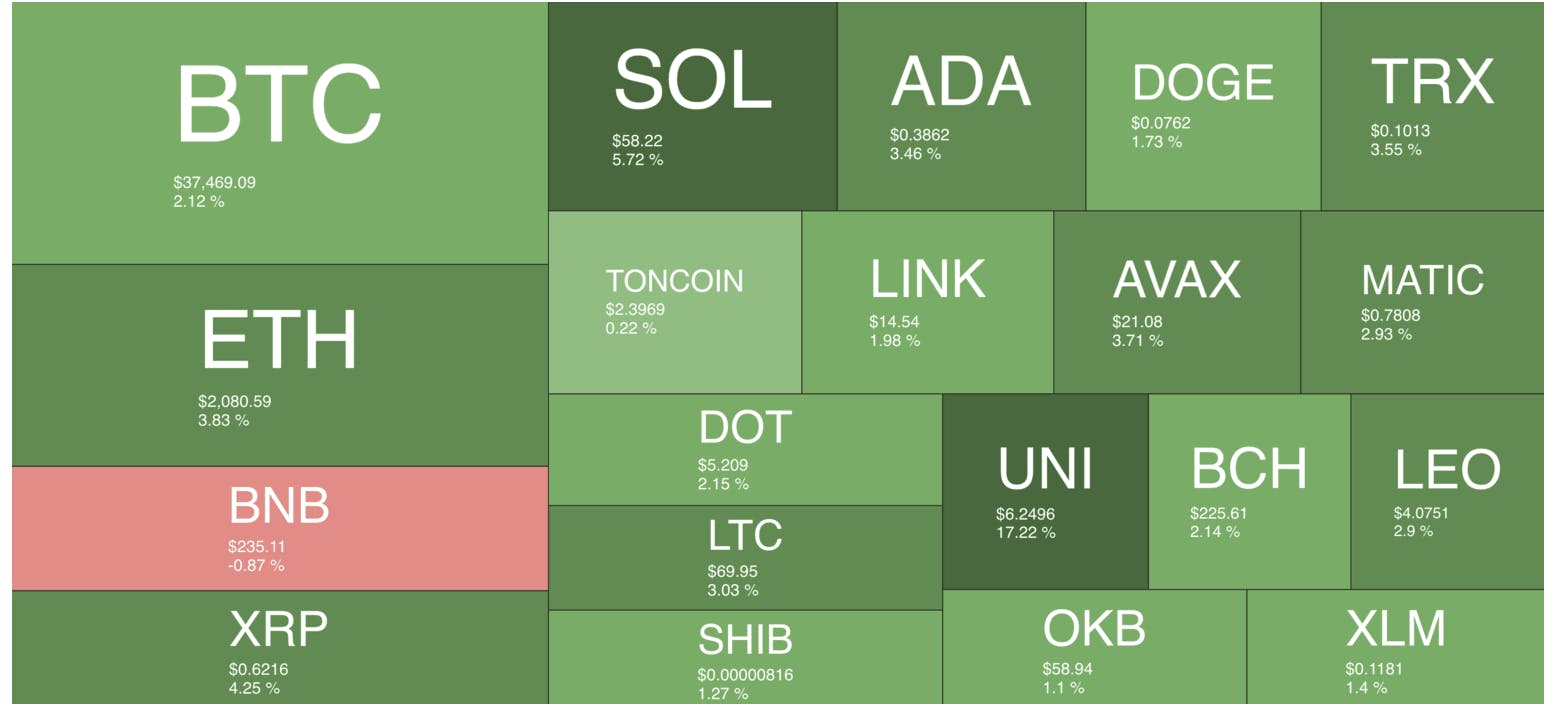Crypto Scoop: Crypto Prices Take A Temporary Hit Following Binance-DOJ News
Crypto Scoop
Back to blog
Yellow Card
2023-11-24
Crypto Scoop
On this page
Amidst legal actions against crypto stakeholders, cryptocurrency prices maintain resilience.
This week, we see shocking developments in crypto regulation and volatile price movements. In this edition of the Crypto Scoop, we review the following.
- Price moves of top cryptocurrencies
- Binance - DOJ legal revelations
- Crypto adoption and regulation in Argentina and South Africa
- Shiba Inu’s recent update.

Heatmap highlighting the recovery of the market (Source: Quantify Crypto)
Price Moves Of Top Cryptocurrencies
In a tumultuous week for the crypto industry, Bitcoin faced a significant setback as it plunged nearly $2,000 within hours of the Binance-DOJ news breaking. Ether's price also declined to $1,930 before rebounding above $2,000.
Despite this upheaval, the market has shown resilience, with Bitcoin successfully reclaiming the $37,000 level and trading at $37,500. Other major altcoins also witnessed volatile moves, with Binance's native cryptocurrency, BNB, experiencing the most losses.
Meanwhile, financial expert Robert Kiyosaki, renowned for "Rich Dad Poor Dad," has urged investors to brace for hyperinflation, advocating Bitcoin as the ultimate protection against government-controlled currencies. Kiyosaki sees Bitcoin as "people's money," emphasising its decentralised nature.
In a separate development, Bitcoin achieved a historic milestone on November 19, 2023, by registering the highest number of daily transactions within a 24-hour span—710,579 transfers were confirmed by miners.
On a positive note, Fidelity, a major player in money management, is looking to launch an exchange-traded fund (ETF) that holds Ethereum's ether (ETH). This move follows in the footsteps of BlackRock's similar initiative. The Fidelity Ethereum Fund is proposed to be listed by Cboe Global Markets, pending approval from the U.S. Securities and Exchange Commission (SEC). This development underscores the increasing acceptance of cryptocurrencies within traditional financial institutions.
Binance and Kraken Hit by U.S. Regulatory Storm
In a landmark legal development, crypto exchange Binance is set to pay a staggering $4.3 billion in one of the largest penalties ever obtained from a corporate defendant. The settlement comes as part of a resolution with the U.S. Department of Justice (DOJ), which accused Binance of multiple offences, including the failure to maintain an anti-money laundering program and violating sanctions laws.
The charges outlined that Binance employees were aware of and discussed serving users in sanctioned countries, knowingly violating U.S. law. Attorney General Merrick Garland emphasised the severity of the allegations during a press conference, stating that Binance knowingly facilitated transactions against U.S. laws. In addition to the DOJ settlement, the U.S. Treasury Department and the Commodity Futures Trading Commission (CFTC) reached their agreements with Binance, with the Treasury Secretary calling it the largest settlement in Treasury history.
Binance's founder, Changpeng Zhao (CZ), has agreed to step down as CEO and plead guilty to charges, personally facing a $50 million fine. The exchange's regional markets head, a former Abu Dhabi regulator, Richard Teng, will take over as the new CEO. As reported by Coindesk, Binance will make a complete exit from the U.S. and is required to appoint an independent compliance monitor for five years and undergo rigorous reporting of its compliance efforts to the U.S. government.
In a parallel development, the United States Securities and Exchange Commission (SEC) has filed charges against cryptocurrency exchange Kraken. The SEC alleges that Kraken's parent companies operated the crypto trading platform as an unregistered securities exchange, broker, dealer, and clearing agency. Among the severe accusations is the SEC's claim that Kraken commingled customer assets with company funds and paid its own bills from an account holding customer funds. According to the SEC, this approach exposed customers to "a significant risk of loss." The charges against Kraken echo similar legal actions taken against other major cryptocurrency exchanges, including Coinbase and Binance.
Shiba Inu's Shibarium Hits Milestones and Unveils Innovative 'Donate' Feature
Since its launch in August, Shibarium, the layer-2 blockchain solution by Shiba Inu (SHIB), has achieved remarkable progress, boasting over 1.5 million blocks and approaching 4 million transactions.
In a recent development, Shiba Inu introduced a groundbreaking feature to Shibarium called the "Donate functionality." This innovative addition empowers users to financially support non-profit validators crucial to the network's security and efficiency.
The Shiba Inu team expressed their commitment to creating a supportive and inclusive ecosystem, stating, "In our continuous effort to foster a supportive and inclusive ecosystem, we have introduced an intuitive donation system enabling users to donate money seamlessly to their preferred non-profit validators." Users now have the opportunity to contribute to the sustainability and expansion of these validators, playing a vital role in enhancing the overall integrity and resilience of the Shibarium network.
South Africa Adopts Crypto-Asset Reporting Framework for Tax Transparency
South Africa has become the sole African nation to adopt the Crypto-Asset Reporting Framework (CARF), joining over 40 other countries and jurisdictions in implementing this tax transparency standard. Developed by the Organisation for Economic Co-operation and Development (OECD) in March 2023, CARF facilitates the automatic exchange of information on crypto exchanges between tax authorities.
This global agreement aims to combat offshore tax avoidance and evasion, with participating countries simultaneously implementing amendments to the Common Reporting Standard (CRS). The South African Revenue Service (SARS) highlights the necessity of adopting CARF to keep pace with the rapid growth of the crypto-asset market and preserve recent gains in global tax transparency.
South Africa's commitment to the international standard reflects its determination to stay abreast of developments and ensure effective regulation in the dynamic crypto landscape.
Argentina Embraces Stablecoins Amidst Economic Change
The President-elect of Argentina, Javier Milei, has promised a wave of economic change set to unfold after his inauguration on December 10. While the exact nature of this transformation remains uncertain, Sebastián Serrano, CEO of Argentina-based cryptocurrency exchange Ripio, believes that stablecoins will play a crucial role in the financial landscape of Argentinians.
Milei's election has sparked enthusiasm within Argentina's crypto community, which is evident in Ripio's experiencing a substantial 180% surge in new users in October. On November 19, the day of the runoff election that brought Milei to power, Ripio witnessed a remarkable 110% week-on-week increase in new users.
Stablecoins have already established themselves as indispensable in Argentina due to challenges accessing traditional banknotes and bank dollars. Serrano emphasises that, regardless of Milei's plan to potentially fully dollarise the economy, stablecoins are likely to gain even more prominence in the future. He notes, "With the difficulties in accessing both banknotes and bank dollars, stablecoins have become indispensable for many companies and individuals."
Disclaimer: This article is for information purposes only and should not be construed as legal, tax, investment or financial advice. Nothing contained in this article constitutes a solicitation, recommendation, endorsement or offer by Yellow Card to buy or sell any digital asset. There is risk involved in investing or transacting in digital assets, please seek professional advice if you require one. We do not assume any responsibility or liability for any loss or damage you may incur dealing with digital assets. For more information on Digital Asset Risk Disclosure please see - Risk Disclosure.



